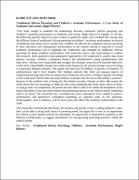| dc.description.abstract | KOIRE JOY (2011-MO92-20020)
Traditional African Parenting and Children’s Academic Performance: A Case Study of Nankoma Sub-county, Bugiri District.
This study sought to establish the relationship between traditional African parenting and children‟s academic performance in Nankoma sub-county, Bugiri district of Uganda. To do this, the following specific objectives were in place to guide the study: (i) to establish the concept and the different forms of traditional African parenting on children‟s academic performance in schools of Nankoma sub-county (ii) to explore how children are affected by traditional African parenting in their education and consequently performance in the schools setting as depicted in school academic performance (iii) to highlight the weaknesses and strengths in traditional African parenting for better academic performance. The researcher used a case study design to conduct this research. Both qualitative and quantitative approaches were employed to analyse data from parents, teachers, children, community leaders and administrators using questionnaires and interviews. All data were transcribed and arranged into thematic areas derived from the objectives of the study. Quantifiable ratings were made using frequencies (f) and percentage scores of ratings to a particular thematic element. The sample size used was 50 children, 10 parents, 10 teachers, 10 administrators and 5 local leaders. The findings indicate that, there are unusual aspects of traditional parenting styles that are employed in Nankoma sub-county in Bugiri Uganda. Parenting is first of all seen with the roles and responsibility of parents who are seen as the primary „parenter‟ because of the cardinal roles of being the first family provider. Parents on their side expect the child whom they are parenting, to abide by rules and completing the home chores given to them. As long as that is accomplished, the parent sees the child as able to fit within the boundaries of the family discipline. It has also been evident, that parenting practices in the African family sometimes tend to be harsh. The researcher has concluded that most respondents have tended to observe authoritarian and permissive (indulgent) parenting on opposite sides of the spectrum. Unfortunately, such a tendency, will in most cases also affect the academic achievement of the child.
The researcher recommends that firstly, the teachers and parents create a uniting platform, where they can be able to bring forth issues of parenting noted, but again this is seen as an opportunity for schools to have guided policies for parenting. An opportunity is proposed for planners at the Ministry of Education, to suggest mechanisms for incorporating parenting practices within the school system.
Key Words: Traditional African Parenting, Children, Academic Performance, Bugiri District. | en_US |


